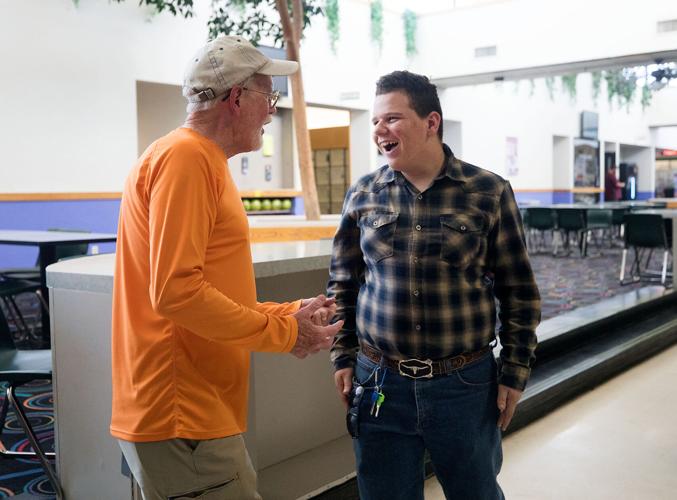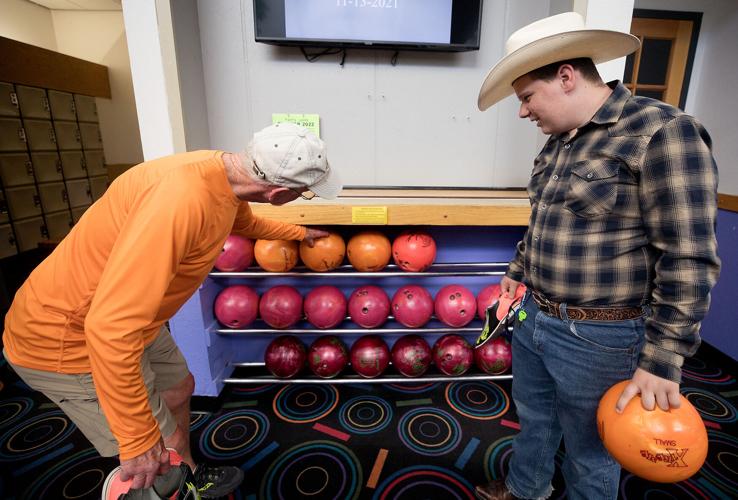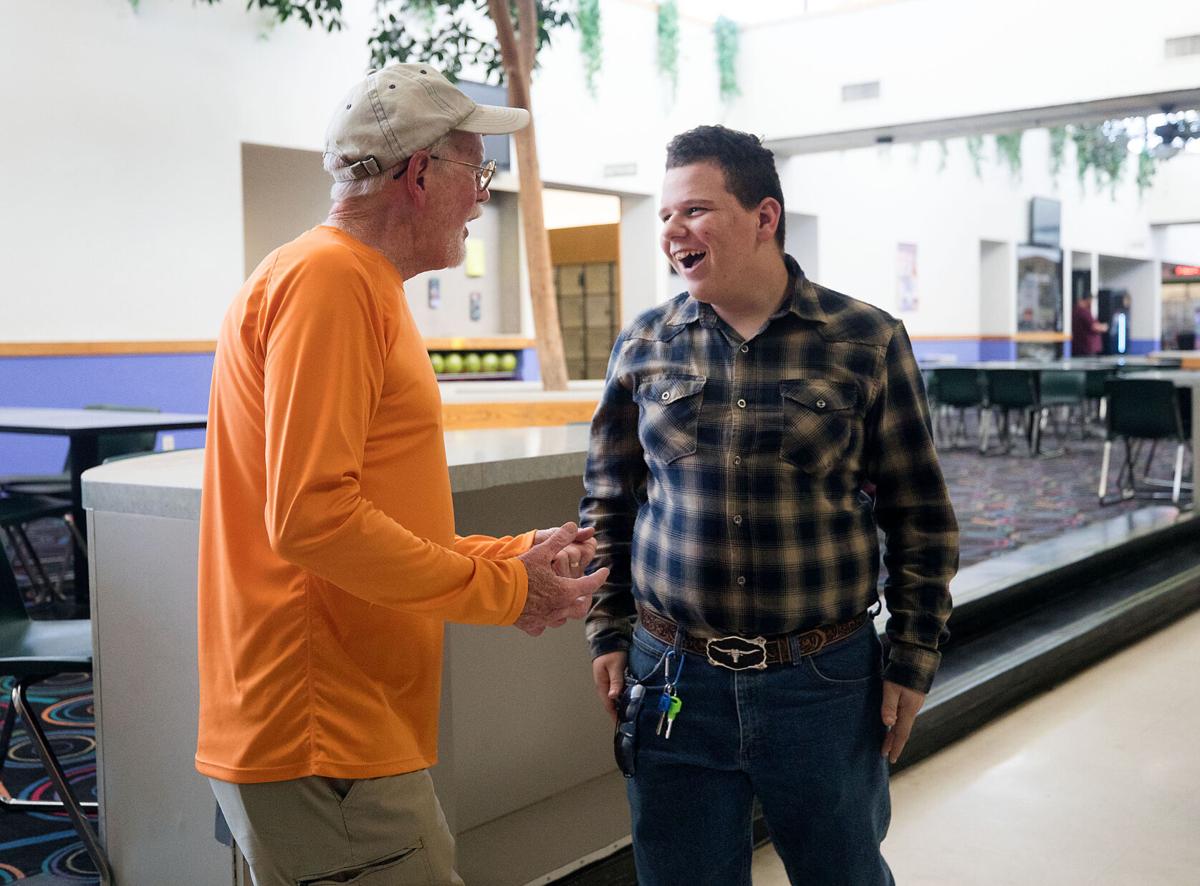Earlier this month, 15-year-old Gabriel Allen bowled the best series of his life, a feat that wouldn't have been possible without the guidance and support of his mentor, Jim Wilkin.
Wilkin and Allen have been meeting up weekly for the past two years, with Wilkin traveling to Eloy every Friday to pick up Allen and bring him back to Tucson for an afternoon of fun.
Sometimes the pair will hike, weather permitting, and other times they'll work on bikes at Wilkin's house or hit up the bowling alley, which Wilkin said they've only done a handful of times.
But whatever they do together, it's time when Allen can just be a kid and not worry about any of the issues he may have going on at home.
Wilkin and Allen were matched through Mentoring Tucson's Kids, a Southern Arizona faith-based nonprofit organization that pairs kids and teens with certain risk factors with an adult friend who can serve as a guide and role model.
Filling a gap in a child's life
Mentoring Tucson's Kids works with more than 25 partner agencies to find mentees and mentors, including the Amphitheater and Tucson Unified school districts, Arizona Department of Child Services, Oro Valley and Marana chambers of commerce, the University of Arizona, Pima Community College, La Frontera and others.
Mentors fill a gap and help enrich the lives of many kids who are growing up in an environment with few resources, said executive director Mary McGuire.
The organization got its start in 1995 when it was created by Don McNeil as One on One Partners. One on One Partners later became One on One Mentoring, and in 2006, McNeil connected with Phoenix's Mentor Kids U.S.A. to help launch a faith-based program in Tucson.
In January 2019, McNeil retired as executive director of both organizations, passing the torch to McGuire. In 2021, the board of directors decided to consolidate the programs to one, with Mentoring Tucson's Kids remaining.
Kids who participate in the program face risk factors in their lives, including coming from a single-parent or group home; having a parent in jail or prison or police or court contact themselves; evidence of substance use issues; struggling or having dropped out of school; living below the poverty line; having a history of physical, emotional or sexual abuse; or struggling with low self-esteem, anxiety or depression.
Studies show that young adults with a mentor are 55% less likely than their peers to skip a day of school and 130% more likely to hold leadership positions, according to Mentor, a nonprofit advocate and resource for mentoring in the United States.
Mentor's website says young adults who face an opportunity gap but have a mentor are 55% more likely to attend college than those who did not have a mentor. Also, studies show that kids with a mentor are 46% less likely than their peers to start using illegal drugs and 27% less likely to start drinking, according to Mentor.
"Now, the need is even more so, with everything kids have navigated over the past two years with COVID and all the changes," McGuire said.
The program pivoted a bit during lockdown to accommodate mentors or mentees who were unable to meet in person, but the great thing about one-on-one mentoring, McGuire said, is the ability to social distance.
"Tucson may be a little hot, but there's a lot of stuff you can do outside and socially distance," she said.
Now that the pandemic is waning or becoming an accepted part of daily life, the group is working to get the word out to schools and other community groups and providers that they're here and ready to support kids through mentoring.

Jim Wilkin, left, and Gabriel Allen, 15, grab their bowling balls before playing a few games at Fiesta Lanes.
Referrals or direct applications
Currently, Mentoring Tucson's Kids is overseeing 15 matches, which McGuire said is on the lower side, but several more are in the works. The program lost a handful of volunteers since the pandemic began, either due to moving or health concerns, and is working to rebuild its force.
"We're always recruiting for mentors," McGuire said. "Our biggest need continues to be mentoring and funding."
Mentors and mentees are matched based on personality, interests and geographical location whenever possible.
"We really want to remove the barriers of them getting together," McGuire said.
Kids get into the program through referrals or direct applications on the website. Mentors can also apply online and are subject to a background and reference check, fingerprint clearance through the Arizona Department of Publics Safety, an interview and training.
Each month, representatives from various Tucson organizations come together to talk about resources and referrals, and in January, the program started a youth advisory group with kids from the program who will give direct feedback.
And while organizers ask that mentors have some affiliation with Christianity or Catholicism, the kids and families they work with can come from any faith.
"We work with children from all backgrounds," McGuire said, adding that there is no religious component in the mentoring.
Building a connection
Allen and Wilkin were hard to miss at Fiesta Lanes that Friday afternoon, with Allen sporting a cowboy hat, shiny leather boots and a silver and bronze belt buckle featuring a steer's head.
Allen racked up three strikes during the pair's three games and even took time to offer Wilkin — who was bowling with his nondominant arm due to an impending shoulder surgery — tips on how to improve his game.
Wilkin used to volunteer with Big Brothers and Big Sisters in Washington state, and says his wife has always been a big supporter of what has proved to be his passion.
It was clear from their rapport that Wilkin and Allen have spent significant time together, as Allen joked about laying down a bet for the the third and final winner-take-all game of the day and Wilkin referred to him more than once as "Tex."
Allen is being raised by his grandmother, so Wilkin, who retired in Tucson, said he found it ironic that Allen would be paired with a mentor old enough to be his grandfather. Despite the age difference, the two have no shortage of things to talk about, Wilkin said.
"The first couple of outings he was kind of quiet," Wilkin said. "But sometimes just being in the vehicle for a while provides conversation. I've got a captive audience. So little by little, we built that connection."
When it comes to the kids he's mentored, it's more about quality than quantity, Wilkin said. "I'm not interested in how many I've worked with," he said. "I'm interested in how many I can really reach."
In addition to their weekly meetups, Allen and Wilkin sometimes participate in Mentoring Tucson's Kids monthly group meetups, but Wilkin said Allen is now at the age when it's not as cool to hang out with the other kids.
"I raised two strong-willed daughters, so I know when not to fight," Wilkin said, after Allen quickly vetoed April's monthly event about healthy eating.
And while learning about healthy eating isn't on Allen's to-do list, Wilkin said he's very open to trying new things.
As they left Fiesta Lanes that day, headed to Eegee's before making the trip back to Eloy, Allen leaned into the fun he'd had, touching Wilkin's arm as they walked through the parking lot toward their truck.
"Now, we've got to do this more often," Allen said.






